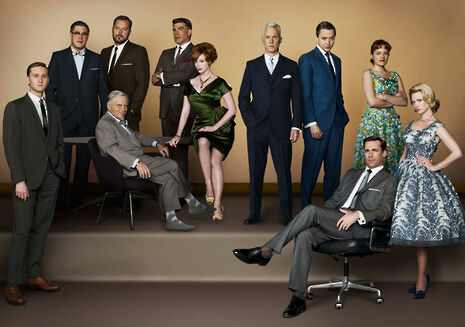The Art of the Binge Watch
Tom Wheeldon on the series to fill your next few guilt-free days and what makes them so addictive

Next week The Royals – a series about a fictional British royal family, starring Liz Hurley – will hit the UK. It’s broadcast on E!, an American channel specialising in "reality TV and Hollywood gossip" – that is to say: so trivial and superficial it will imbue some of the more doggedly intellectual of you with ardent dreams of an incinerated LA. But frankly most of us get tired of poring over dry academic prose in the library every day, and The Royals looks like the perfect antidote to all that. Its trailer opens by flashing images of stereotypically posh people engaging in egregious acts of debauchery, while in a distinctly lustful tone the words "MONEY. SEX. DRUGS. POWER." are spoken in the background. If that doesn’t persuade you to watch it religiously – every single episode, with your eyes unbreakably fixated on the screen in what verges on a trance – I don’t know what will.
All four of those nouns can be found in spades in House of Cards, in which Kevin Spacey portrays with commensurate dramatic skill the ultimate antihero, Frank Underwood – an exasperatingly loveable Lord Voldemort for adults. I watched the first season in three days, the second in two. I’m yet to see the third, mainly because I find the show so enrapturingly entertaining it’s almost worrying. The ingenious Machiavellian plotting of Underwood – and his ice cold, magnetically charismatic and utterly enigmatic wife, portrayed by the magnificent Robin Wright – captivates the viewer as he twists and turns his way up the greasy pole of US politics, in the dizzying heights of power in Washington D.C. Watching this series almost makes you yearn to be an amoral genius driven by nothing but all-corrupting, all-consuming stratospheric ambition.
Mad Men is another US series about which the clattering classes wax lyrical. And even more so than House of Cards, it brings to mind a key element of the plot of David Foster Wallace’s crazily complex, 1000 page long postmodern masterpiece, Infinite Jest: a film known as ‘the Entertainment’. This film is rumoured to be so extremely entertaining that people find it impossible to do anything except watch it again and again in an incessant chain; they simply cannot bring themselves to do anything else – and consequently die. Of course, I am indulging in hyperbole by suggesting that Mad Men is like that, but if Tolstoy were alive in America today, he would be writing the scripts for it. Even this series’ minor characters are at once instantly recognisable and inexhaustibly deep and complex. It centres on Don Draper, the paradigmatic mid-20th century American male, handsome, rich, a genius in the office – except he’s chronically troubled, with a disturbed past that slowly unravels. And the brilliance of Mad Men is that it makes the viewer internalise this paradox of Don Draper: ones regards him with awed envy and heartwrenching pity at the same time.
The success of Mad Men has prompted many cultural critics to say we’re living in a golden age of TV; that it’s superseded film as the premier art form of visual narrative. These striking and thematically rich series – including The Wire, Six Feet Under and Breaking Bad, all brilliant binge fodder – were mainly produced for American cable networks. This really got going when HBO made The Sopranos and revolutionised TV. It’s now 16 years since Season One, but as you gobble through those opening episodes, there’s still that sense of something entirely different being done. Tony Soprano is the chief of the New Jersey Mafia – so far, so normal: everyone finds the Mafia fascinating; it’s a bog standard topic for narrative entertainment. But despite being a terrifyingly ruthless gang leader, Tony is also a genuinely loving family man, suffering from chronic anxiety and depression. All the clichés are busted, and there immediately develops a sense of the series as being like a long novel, perhaps War and Peace, in which the characters change beyond all recognition and yet remain exactly the same. After tearing one’s way through all the 86 episodes of The Sopranos, the (in)famously controversial ending rears its ugly head. Yet however the writers had worked out the denouement, I hated reaching the end of that majestic series – and all TV shows of a similar quality have that effect. Binging on the likes of House of Cards, Mad Men and The Sopranos is different to binging on Häagen-Dasz (and, most likely, The Royals) – you never get sick of them.
 News / SU reluctantly registers controversial women’s soc18 December 2025
News / SU reluctantly registers controversial women’s soc18 December 2025 Features / Should I stay or should I go? Cambridge students and alumni reflect on how their memories stay with them15 December 2025
Features / Should I stay or should I go? Cambridge students and alumni reflect on how their memories stay with them15 December 2025 News / Dons warn PM about Vet School closure16 December 2025
News / Dons warn PM about Vet School closure16 December 2025 News / Cambridge study finds students learn better with notes than AI13 December 2025
News / Cambridge study finds students learn better with notes than AI13 December 2025 Comment / The magic of an eight-week term15 December 2025
Comment / The magic of an eight-week term15 December 2025








